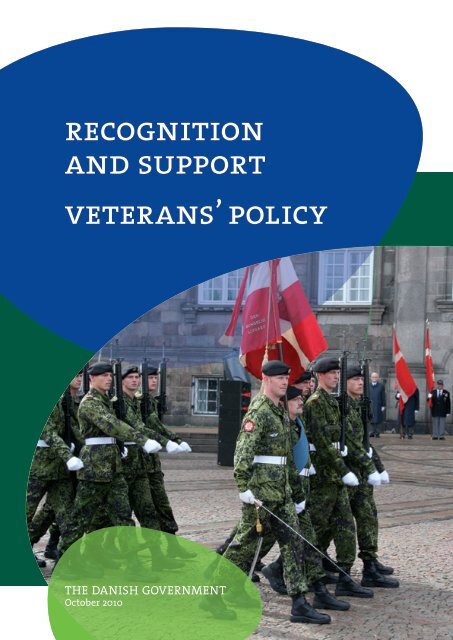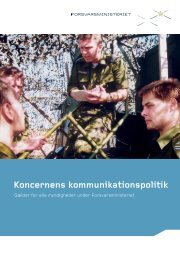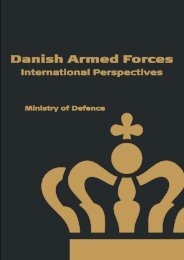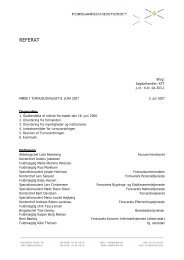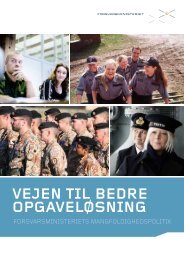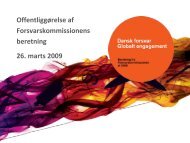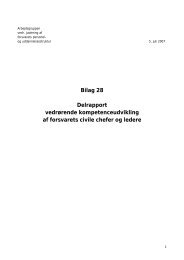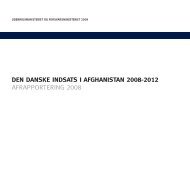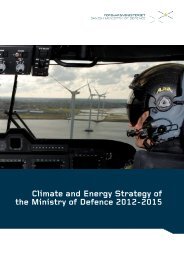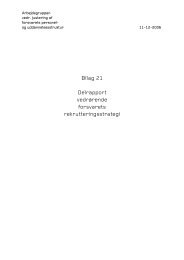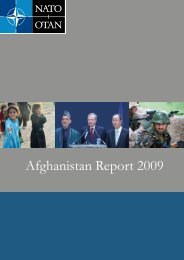the danish veterans' policy
the danish veterans' policy
the danish veterans' policy
- No tags were found...
You also want an ePaper? Increase the reach of your titles
YUMPU automatically turns print PDFs into web optimized ePapers that Google loves.
ContentsPreface 31 Background – in brief 42 The veterans’ <strong>policy</strong> of <strong>the</strong> Government 63 Challenges 8– Veterans in general 9– The relatives 11– The injured 124 Recognition and support 14– Recognition 16– Support 18
ecognitionand supportveterans’ <strong>policy</strong>Regeringen<strong>the</strong> <strong>danish</strong> governmentOctober 2010
2The veterans’ <strong>policy</strong> of <strong>the</strong> Danish government
PrefaceAmong <strong>the</strong> many tasks of <strong>the</strong> Danish Defence are <strong>the</strong> prevention of conflict and war and<strong>the</strong> promotion of a peaceful development in <strong>the</strong> world with respect for human rights.To that end, Denmark has been deploying soldiers to many of <strong>the</strong> world’s hotspots.Since <strong>the</strong> deployment in 1992 of Danish peacekeeping troops to <strong>the</strong> Balkans more than26,000 persons have been deployed at least once to international operations.It is crucial for <strong>the</strong> Danish Government to recognize <strong>the</strong> valuable effort made by <strong>the</strong>veterans and <strong>the</strong>ir relatives for Denmark.Most veterans return with experiences, which have boosted <strong>the</strong>ir professional developmentand widened <strong>the</strong>ir horizon. A minor part of <strong>the</strong> veterans are in need of support tohandle <strong>the</strong> psychical and social traumas or physical injuries, inflicted upon <strong>the</strong>m during<strong>the</strong>ir deployment. In some cases exposed veterans are to be given supplementary supportin order to be on equal terms with o<strong>the</strong>r Danish citizens. This is a task for <strong>the</strong> entiresociety. Fortunately, <strong>the</strong> responsibility to carry out this task, assumed by <strong>the</strong> Government,<strong>the</strong> regions and <strong>the</strong> municipalities, is supplemented by voluntary organizations, and alsoby <strong>the</strong> veterans <strong>the</strong>mselves.With this <strong>policy</strong> <strong>the</strong> Government wants to set <strong>the</strong> framework for <strong>the</strong> optimal way forsociety to recognize and, if necessary, support <strong>the</strong> veterans. This is a task that demandscoordination between many actors, and we encourage a joint approach.The Danish veterans’ <strong>policy</strong> is <strong>the</strong> continuation of a solid foundation of existing initiatives.New knowledge and new experience will continue to benefit <strong>the</strong> veterans and <strong>the</strong>irrelatives. Therefore, <strong>the</strong> veterans’ <strong>policy</strong> will be evaluated in two years in order to securethat we will reach our goal: to recognize and support Denmark’s veterans, whenever<strong>the</strong>re is a need.Gitte Lillelund BechMinister of DefenceThe veterans’ <strong>policy</strong> of <strong>the</strong> Danish government 3
Background – in brief14The veterans’ <strong>policy</strong> of <strong>the</strong> Danish government
Denmark’s security, freedom and prosperity depend,for better or worse, on <strong>the</strong> global development. Safetyand stability are being challenged by new threats, suchas international terrorism, fragile states and attacks oninternational trade. All <strong>the</strong>se elements have an increasinginfluence on <strong>the</strong> horizon and <strong>the</strong> effects of our security<strong>policy</strong>.The deployment of military forces is a substantial contributionto an active Danish foreign and security <strong>policy</strong>.The Defence contributes to prevent conflicts and wars,and to promote democracy, freedom and respect forbasic human rights.In <strong>the</strong> last 20 years, Denmark has substantially increased<strong>the</strong> amount of deployed soldiers in international operations.Simultaneously, <strong>the</strong> conflict environment and <strong>the</strong>threats have grown more severe, and as a consequencewe have had more injured and deceased soldiers.The Defence has made a huge effort to follow up on <strong>the</strong>increasing challenges for <strong>the</strong> individual veteran and <strong>the</strong>veterans’ relatives before, during and after a deployment.The veterans are best supported on <strong>the</strong> basis of a comprehensiveapproach towards <strong>the</strong> individual veteran.It is <strong>the</strong>refore important that this task is solved in collaborationbetween <strong>the</strong> national, regional and local levels.Those employed in <strong>the</strong> Danish Defence are obliged todo service outside <strong>the</strong> national borders. The duty to bedeployed with arms is a basic condition for <strong>the</strong> militaryemployees of <strong>the</strong> Defence. The obligation for deploymentdoes, however, imply a series of consequences for <strong>the</strong>working and private lives of <strong>the</strong> employees.DefinitionThe term veteran describes a person who – asan individual or in a unit – has been deployed toat least one international operation. The personmay still be employed in <strong>the</strong> Defence or ano<strong>the</strong>rauthority, but may also have transferred to <strong>the</strong>civilian educational system, labour market orelsewhere.The veterans’ <strong>policy</strong> of <strong>the</strong> Danish government 5
The veterans’ <strong>policy</strong>of <strong>the</strong> Government26The veterans’ <strong>policy</strong> of <strong>the</strong> Danish government
It is <strong>the</strong> Government’s position that <strong>the</strong> Danish societymust offer a worthy reception to <strong>the</strong> veterans after <strong>the</strong>ireffort as deployed by Denmark.Already, a great number of initiatives have been launchedto secure recognition and support. Public authoritiesand voluntary organizations contribute to <strong>the</strong> recognitionand support of <strong>the</strong> veterans and <strong>the</strong>ir relatives.With <strong>the</strong> veterans’ <strong>policy</strong> <strong>the</strong> Government wants toachieve:– The best possible preparation of <strong>the</strong> employees of <strong>the</strong>Defence before deployment to international operations,and <strong>the</strong> handling of any challenges in <strong>the</strong> time after<strong>the</strong>ir homecoming.– Support for <strong>the</strong> relatives of <strong>the</strong> veterans during <strong>the</strong>whole course of events.– Recognition to <strong>the</strong> veterans for <strong>the</strong> highly importanteffort <strong>the</strong>y have made for <strong>the</strong> Denmark.– Through a comprehensive effort, society offers prompt,relevant, coordinated and respectful treatment of thoseveterans who have been physically or psychicallyinjured in international service.The exact implications are described in chapter 4,regarding recognition and support.Enriched by experiencesIn 2008, veterans from Kosovo and Afghanistanwere asked about <strong>the</strong>ir experiences. Mostveterans regarded <strong>the</strong>ir deployment as havingbeen enriching ra<strong>the</strong>r than straining. Personaldevelopment, comradeship, and <strong>the</strong> experienceof taking part in making a difference, are among<strong>the</strong> experiences that are highly valued.Source: psychologists of <strong>the</strong> Danish DefenceThe veterans’ <strong>policy</strong> of <strong>the</strong> Danish government 7
Challenges38The veterans’ <strong>policy</strong> of <strong>the</strong> Danish government
Veterans in generalDenmark’s veterans have been deployed to <strong>the</strong>semissions, among o<strong>the</strong>rs:– The Army: In December 2001, by invitation of <strong>the</strong>Afghan Transitional Government, <strong>the</strong> UN SecurityCouncil established an international security force toassist Afghanistan in upholding security in <strong>the</strong> country.– The Navy: In <strong>the</strong> Gulf of Aden, <strong>the</strong> navy has lead andparticipated in an international naval force, operatingaround <strong>the</strong> Horn of Africa to establish maritime safetyin <strong>the</strong> area, and at <strong>the</strong> same time fight piracy.– The Air Force: In 1998, <strong>the</strong> Danish parliament decidedto meet a request from NATO for support with fighterplanes for <strong>the</strong> operation Allied Force over Kosovo.– In 2009, Denmark headed <strong>the</strong> field hospital in CampBastion in Afghanistan for three months. About 100Danish doctors, nurses and o<strong>the</strong>r medical personnelmanned <strong>the</strong> field hospital toge<strong>the</strong>r with American andBritish colleagues.In spite of <strong>the</strong> many varied tasks, <strong>the</strong> experiencesand needs of <strong>the</strong> veterans often coincide. One centraland common <strong>the</strong>me for <strong>the</strong> veterans is <strong>the</strong> wish forrecognition of <strong>the</strong>ir effort. The national flag-flying dayfor Denmark’s deployed, <strong>the</strong> Monument for Denmark’sInternational Effort, homecoming parades and awardof medals exemplify signs of gratitude from <strong>the</strong> officialDenmark. A gratitude supplementing <strong>the</strong> one <strong>the</strong>veterans meet in <strong>the</strong>ir close environment.Injured and deceasedin <strong>the</strong> period 1992 – September 2010Physically PermanentMission Deployed injured disability DeceasedThe Balkans abt. 29,000 36 10 12Iraq abt. 6,500 19 10 8Afghanistan abt. 10,500 147 70 37O<strong>the</strong>rs abt. 4,500 0 0 5Total abt. 50,500 202 90 62In this period of time <strong>the</strong>re have been abt. 50,500 deployments,distributed on abt. 26,500 veterans.The term ‘injured’ merely comprises <strong>the</strong> physically injured,as <strong>the</strong>re is no reliable information regarding <strong>the</strong> number ofveterans who suffer from psychical injury in need of treatmentas a consequence of <strong>the</strong>ir deployment.This is what we do today:Talk with psychologistupon homecomingUpon homecoming, veterans from missionswith many hostilities (such as Iraq andAfghanistan) must attend an individual talk witha psychologist in order to determine, whe<strong>the</strong>r<strong>the</strong>y have any immediate need for support(since 2003).The veterans’ <strong>policy</strong> of <strong>the</strong> Danish government 9
Many veterans experience that <strong>the</strong>y get a better knowledgeof <strong>the</strong>mselves through <strong>the</strong>ir deployment. Theencounter with a local population with o<strong>the</strong>r culturalstandards in an area of conflict, and with radicallydifferent problems from those in Denmark, has givennew knowledge to many deployed soldiers.Recognition is thus also to realize and appreciate <strong>the</strong>professional and personal competences that <strong>the</strong> veteransacquire during <strong>the</strong>ir deployment.The time before deployment is characterized by intensiveeducation and training in order to prepare <strong>the</strong> soldier forthat specific mission. During deployment, everyday lifemay be characterized by a lot of waiting time and routinetasks, interrupted by intense periods of straining andunaccustomed situations. In most conflict areas <strong>the</strong>re willbe different dangers, depending on <strong>the</strong> specific situation.Improvised explosive devices and combat are examplesof specific threats against <strong>the</strong> life of <strong>the</strong> individual soldier.Destitution in <strong>the</strong> local population, assault on civilians,and injured and deceased colleagues are o<strong>the</strong>r examplesof experiences that deployed soldiers must be able torelate to specifically. The many foreign influences andstraining situations affect most people both physicallyand psychically. Those are normal reactions to unusualexperiences.The tasks in <strong>the</strong> mission areas are very complex anddemand that a soldier has a high mental readiness.For instance, Danish soldiers must be able to not onlyfight rebel forces, protect <strong>the</strong> local population and takepart in stabilizing an area. They must also be able to enterinto a dynamic teamwork with <strong>the</strong> actors responsible for<strong>the</strong> civilian reconstruction and development effort, andwith <strong>the</strong> local population.After deployment, <strong>the</strong> veteran once again has to adaptto Danish everyday life. The veteran’s mental preparednessmust be brought back to <strong>the</strong> same level, as it wasbefore <strong>the</strong> deployment. This can be difficult after a periodof time where high intensity has been <strong>the</strong> norm. Someveterans also display altered physiological reactions.After a longer deployment period of high preparedness,<strong>the</strong> adrenaline production may be increased, amongo<strong>the</strong>r reactions. It is quite normal that it will take time toget it back to <strong>the</strong> level where it was before deployment.This is what we do today:From ‘Battlemind’ to ‘Homemind’Units that have been in Afghanistan are kepttoge<strong>the</strong>r for up to three months after homecoming.The veterans have <strong>the</strong> opportunityto process <strong>the</strong>ir experience toge<strong>the</strong>r, and toget used to <strong>the</strong> transition to civilian life (firstprogramme was in 2008).10The veterans’ <strong>policy</strong> of <strong>the</strong> Danish government
The psychically injuredIt is normal to react to unpleasant incidents. For mostpeople, <strong>the</strong> reactions fade away again after a brief periodof time. For a minor group, <strong>the</strong> reactions may developinto an actual psychical illness, which needs treatment.Upon <strong>the</strong>ir homecoming, some veterans experiencepassing emotional problems, for instance characterizedby restlessness, sadness, social withdrawal, short temperand aggressive behaviour, or abuse of ei<strong>the</strong>r alcohol oreuphoriants. If <strong>the</strong> symptoms prevail, <strong>the</strong>y may becomepermanent. These problems are a severe strain – also to<strong>the</strong> relatives of <strong>the</strong> veteran. It is important that <strong>the</strong> veterangets help and support as soon as possible.The situation for veterans with emotional problems canbe complicated by social circumstances, such as brokenrelationships, frequent sick-days, or more ordinary problemswith finding <strong>the</strong>ir way back to normal everyday life.Especially <strong>the</strong> emotionally traumatized veterans feel that<strong>the</strong> authorities display a general lack of understandingof <strong>the</strong> problems that may arise due to a deployment.Psychically injured veterans often expect to receive specialconsideration. On <strong>the</strong> o<strong>the</strong>r hand, public authoritiesmay have a problem defining <strong>the</strong> exact problems andmay have a hard time getting <strong>the</strong> necessary informationfrom <strong>the</strong> veteran.The situation is such today that only <strong>the</strong> National Hospitalof Denmark (Rigshospitalet) is able to offer psychiatricassistance with a basis in military vocational knowledge.For veterans living far away from <strong>the</strong> capital, who forinstance suffer from a severe psychic strain reaction,<strong>the</strong> geographic distance may be a barrier in itself.Psychically injured veterans sometimes have a feelingthat <strong>the</strong>ir local authorities do not possess <strong>the</strong> necessaryexperience, and that <strong>the</strong>re is a general lack of knowledgeof <strong>the</strong> special conditions of <strong>the</strong> veterans.Psychically injured veterans may harbour considerableresistance and scepticism towards addressing <strong>the</strong><strong>the</strong>rapeutic system, and may react strongly, if <strong>the</strong>yfeel rejected.In some cases, emotional problems emerge a long timeafter homecoming. Veterans and relatives are informedin detail, which symptoms <strong>the</strong>y should be aware of,and which options <strong>the</strong>re are for treatment by <strong>the</strong> psychologistsof <strong>the</strong> Defence – also after homecoming.The psychologists of <strong>the</strong> Defence are not aware of allveterans with psychic problems. This is ei<strong>the</strong>r because<strong>the</strong> problem has not been recognized by <strong>the</strong> individualveteran, or because <strong>the</strong> person in question does notwant help from <strong>the</strong> Defence.This is what we do today:QuestionnaireFocus on<strong>the</strong> psychically injuredThe Danish Defence sends out questionnaires to<strong>the</strong> veterans six months after <strong>the</strong>ir homecoming.In <strong>the</strong> questionnaires, <strong>the</strong>y may recount <strong>the</strong>irexperiences and reactions after deployment.The psychologists of <strong>the</strong> Defence contact anyveteran who is showing indications of need forsupport, unless <strong>the</strong> veteran specifically declinesthis (since 1997).In 2009, <strong>the</strong> Ministry of Defence and <strong>the</strong> Ministryof Health informed <strong>the</strong> regions and <strong>the</strong> localauthorities that veterans with psychical problemsmay face specific challenges. At <strong>the</strong> same time,<strong>the</strong>y were informed of <strong>the</strong> existing offers ofsupport in <strong>the</strong> Defence and in <strong>the</strong> health system.The veterans’ <strong>policy</strong> of <strong>the</strong> Danish government 13
It is <strong>the</strong> <strong>policy</strong> of <strong>the</strong> Danish Government that veteransmust be recognized for <strong>the</strong>ir effort, and that <strong>the</strong>y and<strong>the</strong>ir relatives must be supported, whenever <strong>the</strong> needarises. This <strong>policy</strong> introduces a series of initiatives,supplementing <strong>the</strong> existing assistance offered by national,regional, and local authorities to all citizens. The initiativesare based on an already existing foundation of initiatives,taken in later years by <strong>the</strong> Defence, among o<strong>the</strong>rs. In thisconnection it is important to emphasize and recognize<strong>the</strong> important effort in this field made by voluntary organizations.In relation to <strong>the</strong> injured veterans, it is important for <strong>the</strong>Government that each initiative is based on <strong>the</strong> situationof <strong>the</strong> individual veteran. The best possible help must beavailable, in order to make <strong>the</strong> veteran able to once againcontribute to society – also in <strong>the</strong> interest of <strong>the</strong> veteranand <strong>the</strong> veteran’s relatives.This is what we do today:The Danish Parliament adoptsa proposal for tax exemptionof soldier’s grantsGrants to support Danish soldiers and civilianemployees, who have been physically orpsychically injured in international operations,are exempt from tax. This also applies to grantsgiven to relatives, in cases where <strong>the</strong> deployedhas been killed or has suffered injury.The reception of a tax-exempt soldiers’ granthas no effect on <strong>the</strong> calculation of cash benefitor starting assistance.The Danish Defence has a special responsibility in relationto <strong>the</strong> deployed soldiers and <strong>the</strong>ir relatives. The overallpurpose of <strong>the</strong> effort is to send out competent soldiers,and to bring back competent human beings.The veterans’ <strong>policy</strong> of <strong>the</strong> Danish government 15
RecognitionIn 2009, <strong>the</strong> Government introduced an official flag-flyingday for Denmark’s deployed. The flag-flying day isobserved every year on 5 September.In 2010, Her Majesty <strong>the</strong> Queen approved <strong>the</strong> institutionof a series of new medals, which can be awarded to <strong>the</strong>individual veteran as a tangible symbol of recognition.Veterans who are physically injured in international operationsare eligible for <strong>the</strong> Defence Medal for Injured inService. The Government recognizes psychical injuryon an equal footing with physical injury. Therefore, <strong>the</strong>following initiative is taken:The psychically injured are recognized on an equalfooting with <strong>the</strong> physically injured. From now on,<strong>the</strong> Defence Medal for Injured in Service can beawarded to <strong>the</strong> psychically injured.Out of respect for <strong>the</strong> many who have been deployedto areas of conflict and disasters, for those who aredeployed now, those who will be deployed in <strong>the</strong> future,and for those who have perished, <strong>the</strong> Government hasdecided to erect a monument in 2011 for Denmark’sinternational effort since 1948. The monument will besituated on <strong>the</strong> Princess’ Bastion at <strong>the</strong> Citadel inCopenhagen.The Government recognizes <strong>the</strong> competencesof <strong>the</strong> veteransThe competences and experience of <strong>the</strong> veterans mustbe utilized. The recognition of <strong>the</strong> veterans’ competences,which have been built up throughout <strong>the</strong>ir educationin <strong>the</strong> Defence and later on fortified in <strong>the</strong> missionarea, should be developed through real competenceevaluation. Therefore, <strong>the</strong> following initiative is taken:The basis for real competence evaluation and guidancemust be streng<strong>the</strong>ned. The schools and <strong>the</strong> YouthEducational Guidance must be informed of <strong>the</strong> competencesachieved by <strong>the</strong> veterans in connection with <strong>the</strong>ireducation and deployment. In this way <strong>the</strong> veteranswill have <strong>the</strong> greatest possible benefit from <strong>the</strong>ircompetences in connection with fur<strong>the</strong>r education.Fur<strong>the</strong>rmore, with <strong>the</strong> consent of <strong>the</strong> individual veterans,<strong>the</strong> Ministry of Education and <strong>the</strong> Ministry of Defencewill pass on information regarding veterans youngerthan 25 years to <strong>the</strong> Youth Educational Guidance.In this way <strong>the</strong> young person in question can receiveoptimal counselling in connection with <strong>the</strong>ir choice ofa youth education.Cash benefit beforestarting assistanceIn <strong>the</strong> autumn of 2010, <strong>the</strong> Government willsubmit a proposal to ensure that veterans, whohave been deployed for Denmark in a militarymission, can include <strong>the</strong> sojourn into <strong>the</strong> prerequisite7 years’ residence on Danish soil outof 8 years in order to be able to receive cashbenefit instead of starting assistance.16The veterans’ <strong>policy</strong> of <strong>the</strong> Danish government
The veterans’ competences must be rendered visible.The veterans’ competences must be described andvalue-determined in relation to <strong>the</strong> public educationalsystem in order to create transparency and comparability,and also to ease <strong>the</strong> terms of merit rating; especially inrelation to those veterans who leave <strong>the</strong> Defence. Therefore,<strong>the</strong> following initiative is taken:The establishment of a project within <strong>the</strong> frameworkof <strong>the</strong> National Centre for Competence and QualityDevelopment with <strong>the</strong> purpose of throwing light on <strong>the</strong>real competences of <strong>the</strong> veterans. On <strong>the</strong> basis of <strong>the</strong>real competence evaluation, <strong>the</strong> veteran gets a competencecard describing knowledge, skills and competencesin relation to a continued education in <strong>the</strong> publiceducational system and in relation to employmentpossibilities in <strong>the</strong> labour market.Tangible proof of deploymentThe effort of <strong>the</strong> individual veteran in international missionsis being documented. Therefore, <strong>the</strong> followinginitiative is taken:Veterans from international service will receive aveterans’ card as documentation and recognitionof <strong>the</strong>ir international service.Initially, <strong>the</strong> project will be carried out as a pilot projectfor units of <strong>the</strong> army.The veterans’ <strong>policy</strong> of <strong>the</strong> Danish government 17
SupportThe supporting initiatives of <strong>the</strong> Danish Defence focusboth on <strong>the</strong> veterans and <strong>the</strong>ir relatives. It is a wide arrayof initiatives that is being offered before, during and afterdeployment.In order to support and follow <strong>the</strong> soldier and his/herrelatives during <strong>the</strong> course of a deployment, <strong>the</strong> Defencehas established a so-called contact officer system.The contact officer is <strong>the</strong> connection between <strong>the</strong> Defenceand <strong>the</strong> relatives, both before, during and after <strong>the</strong> deployment.The contact officer can be contacted at all times.He is typically <strong>the</strong> point of contact to access <strong>the</strong> supportoffers of <strong>the</strong> Danish Defence.The Government streng<strong>the</strong>ns <strong>the</strong> offerof support by <strong>the</strong> DefenceThe offer for support by <strong>the</strong> Defence is streng<strong>the</strong>nedby <strong>the</strong> concentration of <strong>the</strong> resources. One centre forrecognition and support – one access point. Therefore,<strong>the</strong> following initiative is taken:A veterans’ centre is established to provide service toveterans, relatives and o<strong>the</strong>r actors in <strong>the</strong> veterans’field. This means that <strong>the</strong>re will be one single accesspoint for enquiries regarding veterans and one singlephone number, which will be available 24/7. Amongo<strong>the</strong>r things, <strong>the</strong> veterans’ centre will:– Respond to enquiries about conditions concerningdeployment to international missions.– Offer counselling on options for support in <strong>the</strong> publicsector and in <strong>the</strong> Defence.– Offer comprehensive support, for instance in caseswhere a veteran is struggling with both social andemotional problems.– Lend support in cases where <strong>the</strong> solution of a veteran’sproblems involves <strong>the</strong> local or various publicauthorities, or perhaps needs to cross national,regional, and local boundaries.The resources of <strong>the</strong> Defence in <strong>the</strong> veterans’ area, suchas educational counsellors, psychologists and socialworkers, are physically put toge<strong>the</strong>r in <strong>the</strong> veterans’centre. The centre must ensure that <strong>the</strong> effort isconstantly developing in all relations regarding <strong>the</strong>recog nition and support for veterans and <strong>the</strong>ir relatives.The veterans’ centre will initiate cooperation across <strong>the</strong>public sector, and will include and, where necessary,consult <strong>the</strong> National Knowledge and Special AdvisoryFunction. The coordinated effort of <strong>the</strong> veterans’ centremust be qualified and developed, through research andby exchange of experience with NATO partners, amongo<strong>the</strong>rs.Briefings, psychological prevention etc.– also for <strong>the</strong> relativesIn order to prepare <strong>the</strong> soldiers for <strong>the</strong> challenges <strong>the</strong>y maymeet while deployed, <strong>the</strong> Defence carries out a series ofbriefings before deployment. The purpose of this is toprevent possible emotional reactions, among o<strong>the</strong>r things.At <strong>the</strong> same time, <strong>the</strong> Defence focuses on <strong>the</strong> follow-upeffort.During deployment, <strong>the</strong> soldiers may be involved in variousviolent incidents, which call for a crisis-psychologicaleffort. In order to be able to prevent any mental damage,<strong>the</strong> heads and leaders are educated by <strong>the</strong> psychologistsof <strong>the</strong> Defence in <strong>the</strong> prevention and handling of strainingincidents.At <strong>the</strong> same time, <strong>the</strong>re is a focus on <strong>the</strong> preparationof <strong>the</strong> individual soldier. All soldiers are briefed beforedeployment on how to prevent any crises and on signsof emotional reactions.The Government wants to improve <strong>the</strong> effort to preventpsychical reactions.” Therefore, <strong>the</strong> following initiative istaken:The selection of soldiers for international operations,which at present is carried out by health personnel,is fur<strong>the</strong>r developed. This includes an evaluation ofa soldier’s preparedness for deployment.The Defence fur<strong>the</strong>rmore wants to support <strong>the</strong> relativesand to recognize <strong>the</strong>ir effort. Therefore, a series of <strong>the</strong>initiatives of <strong>the</strong> Defence is aimed at <strong>the</strong> relatives.18The veterans’ <strong>policy</strong> of <strong>the</strong> Danish government
What has already been done?The Defence has carried out a series of initiativeswith substantial impact on <strong>the</strong> area.An overview of initiatives for recognition andsupport can be found on <strong>the</strong> homepage of<strong>the</strong> Ministry of Defence www.fmn.dk.An important part of <strong>the</strong> support for <strong>the</strong> relatives is briefingsregarding <strong>the</strong> mission, which <strong>the</strong> soldier is to bedeployed to, and regarding <strong>the</strong> options for support offeredto <strong>the</strong> relatives. These briefings are carried out in connectionwith meetings for <strong>the</strong> relatives, both before and duringdeployment. This is where <strong>the</strong> relatives are informed of <strong>the</strong>current mission, and any issues <strong>the</strong> relatives should beaware of. The relatives meet with <strong>the</strong> contact officer, and<strong>the</strong>y are briefed about typical emotional reactions, optionsfor support, family networks, and contact options in connectionwith any need for support.The children of deployed personnel may be heavily affectedby <strong>the</strong> deployment, and by <strong>the</strong> worries and altered reactionsof <strong>the</strong> partner left behind. Therefore, <strong>the</strong> childrenmay need special support. The effort to support <strong>the</strong>children, including <strong>the</strong> effect of <strong>the</strong> established supportgroups for children, must be examined. Therefore, <strong>the</strong>following initiative is taken:The effect of <strong>the</strong> deployment on partner and childrenwill be examined with a view to a possible increase in<strong>the</strong> support for <strong>the</strong> relatives.The Government streng<strong>the</strong>ns knowledgeand preventionIn order to continuously be able to target and optimize<strong>the</strong> effort in <strong>the</strong> veterans’ area, it must be fur<strong>the</strong>r developedon <strong>the</strong> basis of exact knowledge from scientific andsystematic follow-up on <strong>the</strong> experience of <strong>the</strong> Defenceand international research. Therefore, <strong>the</strong> followinginitiative is taken:A permanent knowledge centre is established. Knowledgeregarding veterans’ conditions must be put to usefor, among o<strong>the</strong>r things, <strong>the</strong> prevention of damage, <strong>the</strong>evaluation and development of focus areas, and <strong>the</strong>cooperation with external research institutions. Thus,<strong>the</strong> effort for veterans and <strong>the</strong>ir relatives is carried outon an increasingly qualified basis.The Government increases <strong>the</strong> follow-up effortThe Defence carries out a homecoming project for veteransfrom Afghanistan. In <strong>the</strong> project, called ‘Acclimati zationand Reintegration’, <strong>the</strong> unit is kept toge<strong>the</strong>r for athree months’ period of time after homecoming. In thisway, <strong>the</strong> veterans get <strong>the</strong> possibility of dealing with <strong>the</strong>experiences toge<strong>the</strong>r. At <strong>the</strong> same time, <strong>the</strong> veteransget used to <strong>the</strong> transition to civilian life. The veterans alsoget <strong>the</strong> possibility to identify <strong>the</strong>ir competences, and arethus prepared to apply for a civilian job, an educationor a position in <strong>the</strong> Defence.In order to counter any emotional reactions, <strong>the</strong> Defencehas initiated a series of o<strong>the</strong>r follow-up initiatives insupport of returned veterans.For instance, veterans from tough missions must attendan interview with a psychologist upon homecoming inorder to determine whe<strong>the</strong>r <strong>the</strong>re is a need for support.After homecoming, <strong>the</strong> Defence carries out homecomingmeetings for <strong>the</strong> formerly deployed units. Here, <strong>the</strong> soldiershave <strong>the</strong> possibility to meet old buddies and talkabout <strong>the</strong>ir experiences. At <strong>the</strong> same time, <strong>the</strong> Defenceis able to follow up on any emotional reactions with <strong>the</strong>veterans.Six months after <strong>the</strong> end of a mission, <strong>the</strong> veteranreceives a questionnaire, requesting replies to <strong>the</strong>veteran’s experiences and reactions after homecoming.The psychologists of <strong>the</strong> Defence address those veterans,whose replies indicate signs of need for support.No citizens are being forced to receive psychologicalor psychiatric help. However, emotionally traumatizedveterans must be contacted to a greater extent thanbefore and be offered help. Therefore, <strong>the</strong> followinginitiatives are taken:There will be an active follow-up on veterans, whoseemployment with <strong>the</strong> defence has ended. The aim isto keep in contact with veterans within <strong>the</strong> first yearsafter <strong>the</strong>ir transition to civilian life.The Defence will streng<strong>the</strong>n selected veterans’ abilityto render buddy support. The framework for buddysupport are clearly defined, and in such a way thatsocial and medical personnel of <strong>the</strong> Defence will beinvolved whenever needed.The veterans’ <strong>policy</strong> of <strong>the</strong> Danish government 19
The Government increases <strong>the</strong> supportfor <strong>the</strong> injured soldierThe Defence is employer for <strong>the</strong> deployed soldiers.Among o<strong>the</strong>r things, <strong>the</strong> employer’s responsibility isexecuted through a series of initiatives for <strong>the</strong> benefit of<strong>the</strong> employees. Injured veterans often have special needsfor support. Therefore, <strong>the</strong> Defence has a natural responsibilityto help those veterans who have been injured inservice for Denmark.The Defence offers support to those veterans who havesuffered injury during deployment. The efforts of doctors,psychologists, legal advisers, contact officers and o<strong>the</strong>rsare coordinated. At <strong>the</strong> same time, <strong>the</strong> Defence helps<strong>the</strong> injured veteran to get an overview of <strong>the</strong> possibilitiesfor receiving support from <strong>the</strong> public system, in <strong>the</strong> formof adjustment of <strong>the</strong> lay-out of home and workplace,industrial injury compensation, and more.Support for <strong>the</strong> injured veteran must be based on <strong>the</strong>individual situation, in order that <strong>the</strong> veteran is given <strong>the</strong>best possible terms for rehabilitation.Severely physically injured veterans have often sufferedvery complicated and comprehensive injuries, whichdemand long periods of rehabilitation. The Governmentwants to offer <strong>the</strong> best possible treatment and <strong>the</strong> bestpossible conditions for rehabilitation. An effort which willalso benefit o<strong>the</strong>r injured citizens.Rehabilitation for<strong>the</strong> physically injuredBy means of donations, private funds haveboosted <strong>the</strong> specialized rehabilitation for <strong>the</strong>physically injured veterans (and o<strong>the</strong>r patients)at <strong>the</strong> National Hospital. Among o<strong>the</strong>r things,<strong>the</strong> donations secure <strong>the</strong> acquisition of modernphysio<strong>the</strong>rapeutic and occupation-<strong>the</strong>rapeuticrehabilitation equipment.Some veterans, who suffer injuries, for instance by improvisedexplosive devices, may risk amputations as a resultof <strong>the</strong>ir injuries. Before <strong>the</strong>ir injuries, <strong>the</strong> veterans haveengaged in intensive physical training, and to <strong>the</strong> greatestextent <strong>the</strong>y must get back <strong>the</strong> possibility to take up anactive life of athletics. Therefore, <strong>the</strong> Government wantsto take <strong>the</strong> following initiative:A significantly increased effort for <strong>the</strong> physically injured.More personnel are to be employed at <strong>the</strong> departmentsof <strong>the</strong> National Hospital involved in <strong>the</strong> rehabilitationof injured soldiers, and fur<strong>the</strong>r retraining equipment isprocured. The competences of Danish <strong>the</strong>rapists in<strong>the</strong> area of rehabilitation of injured veterans must bestreng<strong>the</strong>ned through exchange of experience with foreign<strong>the</strong>rapists. In <strong>the</strong> setting of <strong>the</strong> Defence, veteranswith amputations will be offered sports artificial limbs,so that injured soldiers may again take up an active lifeof athletics according to <strong>the</strong>ir own wishes and needs.With a view to increasing <strong>the</strong> access to knowledge of<strong>the</strong> special conditions of injured veterans, <strong>the</strong> followinginitiatives are taken:The veterans will be a part of <strong>the</strong> target group of <strong>the</strong>National Knowledge and Special Advisory Function(VISO). The VISO is a support function for citizens, localauthorities, and special institutions alike, which may allturn to <strong>the</strong> VISO for special counselling and help forclearing up problems in <strong>the</strong> social vocational area.In <strong>the</strong> VISO, <strong>the</strong>re are professional competences andspecialized knowledge in this area. Therefore, <strong>the</strong> VISOcan serve as a support function for local authorities andspecial institutions in cases, where <strong>the</strong> individualmunicipality has no established expertise. The citizensmay also address <strong>the</strong> VISO directly. By including <strong>the</strong>veterans in <strong>the</strong> VISO target group, it is ensured that aveteran with an especially complicated need is met with<strong>the</strong> highest expertise, regardless of whe<strong>the</strong>r <strong>the</strong> veteranlives and works in Nor<strong>the</strong>rn Jutland or on Bornholm.At <strong>the</strong> same time, <strong>the</strong> veterans’ centre can profit from<strong>the</strong> knowledge of <strong>the</strong> VISO in relevant cases.20The veterans’ <strong>policy</strong> of <strong>the</strong> Danish government
Education in veterans’ conditions is carried out for localcaseworkers and employees of <strong>the</strong> district psychiatry.The education is organized to include experience fromlocal authorities and <strong>the</strong> health system. The educationis carried out in <strong>the</strong> setting of <strong>the</strong> new veterans’ centre.Fur<strong>the</strong>rmore, digital access to examples of goodpractice is established, so that <strong>the</strong> local job centres,<strong>the</strong> social psychiatry and o<strong>the</strong>rs may draw on existingknowledge.Free psychological assistance– also for <strong>the</strong> relativesThe Defence offers psychological assistance to allvete rans, who in an international mission have beenexposed to traumatizing events, or are having problemsreadjusting to everyday life after a deployment. This offerhas no period of limitation, and it is also valid for alreadydischarged veterans. The offer fur<strong>the</strong>rmore includes <strong>the</strong>relatives of <strong>the</strong> veterans. In addition to this, <strong>the</strong> psychologistsoffer couples’ <strong>the</strong>rapy for <strong>the</strong> veterans and <strong>the</strong>irrelatives, as a deployment may be a severe strain ona relationship.The offer for psychological assistance is valid for treatmentby <strong>the</strong> psychologists of <strong>the</strong> Defence in Copenhagen,and also for treatment by one of <strong>the</strong> 50 or soprivately practising psychologists around <strong>the</strong> country,who are connected to <strong>the</strong> network of <strong>the</strong> Defence.The Government expands <strong>the</strong> accessto psychiatric special knowledgeSome emotionally traumatized veterans may needpsychiatric treatment. Today, <strong>the</strong> highly specialized psychiatrictreatment is centralized at <strong>the</strong> National Hospital.The Defence has made an agreement with <strong>the</strong> Crisis andCatastrophe Centre in Copenhagen for evaluation andpossible treatment of soldiers with post-traumatic stressreactions.The limited accessibility is a problem for <strong>the</strong> patients.Therefore, <strong>the</strong> following initiatives are taken:A highly specialized offer is developed and establishedin <strong>the</strong> hospital service targeting patients with psychiatricdisorders, primarily severe post-traumatic stress reactionsas a result of service-related strain in connectionwith deployment.Highly specialized offers targeting <strong>the</strong> patient group areestablished in several locations around <strong>the</strong> country inconnection with existing multi-branching psychiatricallyspecialized functions in <strong>the</strong> hospital service.The access of emotionally traumatized veterans to supportfrom a psychologist or a social worker is improved,so that more people in need of support can use <strong>the</strong>existing options. The following initiative is taken:The access to consultation with one of <strong>the</strong> socialworkers, psychologists or network psychologists of<strong>the</strong> Defence is improved. In this connection, referralconsul tations are to be possible elsewhere than in <strong>the</strong>establishments of <strong>the</strong> Defence, for instance in <strong>the</strong> newveterans’ homes.Outreach effortIn 2007, <strong>the</strong> Defence sent out abt. 20,000 lettersto formerly deployed persons. Among o<strong>the</strong>rthings, <strong>the</strong> purpose was to call <strong>the</strong>ir attentionto <strong>the</strong> time-unlimited possibility for support from<strong>the</strong> psychologists of <strong>the</strong> Defence. Subsequently,200 veterans indicated a need for follow-upsupport from psychologists.The veterans’ <strong>policy</strong> of <strong>the</strong> Danish government 21
This is what we do today:When a soldier is seriously injuredor perishesThe special compensation and indemnificationsystem of <strong>the</strong> Danish Defence:100 per cent permanent handicap 3,653,500 DKKLoss of providerLoss of non-provider(compensation for <strong>the</strong> estate)2,436,000 DKK1,216,500 DKKExample:A soldier with an annual salary of 275,000 DKK loses bothlegs in battle and suffers injury to his stomach. Handicapdegree 120 per cent and loss of earning capability 50 percent.Law on industrial injury insuranceDefenceTotal (tax exempt)902,400 DKK3,653,500 DKK4,555,900 DKKCompensation for loss of earning capability. The veteranis awarded a loss of earning capability of 50 per cent.Until his/her 67th year of age, he/she will receive a monthlytaxable amount of 9,167 DKK.Economic securityIn addition to <strong>the</strong> ordinary compensation and indemnificationaccording to <strong>the</strong> law on industrial injury insuranceand <strong>the</strong> accord on group life insurances, <strong>the</strong> soldiersdeployed to international operations are covered by <strong>the</strong>special indemnity and compensation arrangement of<strong>the</strong> Defence. This arrangement has been established,because it can be very difficult for <strong>the</strong> individual soldierto get insurance in connection with deployment to warzones. The main purpose of <strong>the</strong> arrangement is to secure<strong>the</strong> soldier or <strong>the</strong> soldier’s family in <strong>the</strong> event of <strong>the</strong> soldierdying or getting injured during deployment. The insurancesum will be paid independently of ordinary industrial injuryinsurances and any o<strong>the</strong>r private insurance.Handicap degrees for psychical injuryare investigatedPsychically injured veterans live with special inconveniencesand problems. Therefore, <strong>the</strong> Government takes<strong>the</strong> following initiative:The industrial injury authority investigates, whe<strong>the</strong>r<strong>the</strong>re is a need for adjustment of <strong>the</strong> handicap degreesof psychically injured veterans and o<strong>the</strong>rs.22The veterans’ <strong>policy</strong> of <strong>the</strong> Danish government
The voluntary and occupationalorganizationsThe Government recognizes <strong>the</strong> huge and importanteffort, which is made by volunteers, among o<strong>the</strong>rs.As an example, in <strong>the</strong> setting of <strong>the</strong> many voluntary associationsand <strong>the</strong> occupational organizations, veteransare able to share <strong>the</strong>ir experiences with o<strong>the</strong>r veterans,who know <strong>the</strong> context and understand <strong>the</strong> specialproblems that may arise after a deployment. In additionto this, it is a great sign of recognition of <strong>the</strong> veteransthat so many people offer <strong>the</strong>ir help unselfishly.Some tasks are best dealt with in ano<strong>the</strong>r context, forinstance in cases where a former employer or publicauthorities are altoge<strong>the</strong>r opted out. In <strong>the</strong>se cases,<strong>the</strong> volunteers and <strong>the</strong> organizations have an importantfunction in relation to making contact to those veterans,who withdraw from <strong>the</strong> established offers. This contactgives an opportunity to help <strong>the</strong> injured veteran moveon to professional treatment.Among o<strong>the</strong>r things, <strong>the</strong> Government’s coming strategyfor civilian society will focus on streng<strong>the</strong>ning <strong>the</strong> frameworkfor cooperation between <strong>the</strong> voluntary socialorganizations, <strong>the</strong> public sector and <strong>the</strong> private sector.The Government is aware of <strong>the</strong> potential of includingcivilian society in <strong>the</strong> solution of social problems inrelation to target groups, such as <strong>the</strong> psychically injuredveterans.Support and coordination of <strong>the</strong> effort ofvoluntary and occupational organizationsThe effort of voluntary and occupational organizations issupported and coordinated for <strong>the</strong> benefit of <strong>the</strong> veteransand <strong>the</strong>ir relatives. Therefore, <strong>the</strong> following initiatives aretaken:The voluntary organizations are given better possibilitiesto coordinate <strong>the</strong>ir efforts. A veterans’ secretariat isestablished, in order to optimize <strong>the</strong> possibility ofsolving major tasks across <strong>the</strong> various associations,among o<strong>the</strong>r things. The veterans’ secretariat will beable to coordinate tasks, such as <strong>the</strong> collection anddistribution of sponsorships.Homepages in <strong>the</strong> Defence and in voluntary organizationsare coordinated to give a better overview. At <strong>the</strong>same time, <strong>the</strong> coordinated information will be putto use as an information database for o<strong>the</strong>r publicauthorities.EvaluationThe veterans’ area is complex, especially concerning<strong>the</strong> conditions for <strong>the</strong> psychically injured veterans.New knowledge in this field is constantly optimizing<strong>the</strong> combined effort. The effort in <strong>the</strong> veterans’ areawill be continuously developed, and <strong>the</strong> veterans’ <strong>policy</strong>will be evaluated after two years. In connection with<strong>the</strong> evaluation, a conference will be held with <strong>the</strong>participation of representatives for <strong>the</strong> occupationalorganizations and <strong>the</strong> voluntary actors, among o<strong>the</strong>rs.This is what we do today:Veterans’ homesWith support from <strong>the</strong> Defence and funds,among o<strong>the</strong>rs, three veterans’ homes havebeen established. Here, <strong>the</strong> veterans and <strong>the</strong>irrelatives can meet. Volunteers with connectionsto army or naval associations, and with aninterest in <strong>the</strong> matter, manage <strong>the</strong> day-to-dayrunning of <strong>the</strong> homes (since 2010).The veterans’ <strong>policy</strong> of <strong>the</strong> Danish government 23
New Initiatives in<strong>the</strong> Government’s Veterans’ Policy• A veterans’ centre will be established to coordinate<strong>the</strong> effort for veterans and <strong>the</strong>ir relatives.Responsibility: Ministry of Defence• A veterans’ secretariat will be established to supportvoluntary organizations.Responsibility: Ministry of Defence• A knowledge centre will be established.Responsibility: Ministry of Defence• Enhanced effort for <strong>the</strong> physically injured.Responsibility: Ministry of Internal Affairs and Healthand Ministry of Defence• Enhanced treatment for <strong>the</strong> psychically injuredveterans.Responsibility: Ministry of Internal Affairs and Health• Enhanced selection of soldiers for deployment.Responsibility: Ministry of Defence• Veterans are to be a part of <strong>the</strong> target group for<strong>the</strong> National Knowledge and Special AdvisoryFunction (VISO).Responsibility: Ministry of Social Affairs• Education of municipal caseworkers in <strong>the</strong> conditionsof <strong>the</strong> veterans.Responsibility: Ministry of Defence• Enhanced basis for real competence evaluation andguidance.Responsibility: Ministry of Education and Ministryof Defence• Issuance of competence cards.Responsibility: Ministry of Defence• Improved access to psychologists and social workers.Responsibility: Ministry of Defence• Improved buddy support. Responsibility:Ministry of Defence• Enhanced outreach effort towards formerly employedveterans.Responsibility: Ministry of Defence• Examination of <strong>the</strong> influence of deployment on partnerand children.Responsibility: Ministry of Defence• One single access point to web-based information.Responsibility: Ministry of Defence• 24/7 access to phone support and counselling.Responsibility: Ministry of Defence• Investigation in <strong>the</strong> area of consultative percentages ofpermanent disability from psychical injury for veteransand o<strong>the</strong>rs.Responsibility: Ministry of Employment• Recognition of equality of <strong>the</strong> physically and psychicallyinjured.Responsibility: Ministry of Defence• Issue of veterans’ card as a proof of identity.Responsibility: Ministry of DefenceRead more about <strong>the</strong> veterans’ <strong>policy</strong> on<strong>the</strong> homepage of <strong>the</strong> Danish Ministry of Defence:www.fmn.dk24The veterans’ <strong>policy</strong> of <strong>the</strong> Danish government
Recognition and supportThe veterans’ <strong>policy</strong> of <strong>the</strong> Danish GovernmentOctober 2010:39For any enquiry regarding this publication,please contact:Danish Ministry of DefenceHolmens Kanal 42DK-1060 CopenhagenDenmark+45 33 92 33 20fmn@fmn.dkwww.fmn.dkISBN electronic version978-87-92480-94-1Design BGRAPHICPhotos Danish DefenceThe publication can be downloaded atwww.fmn.dk


